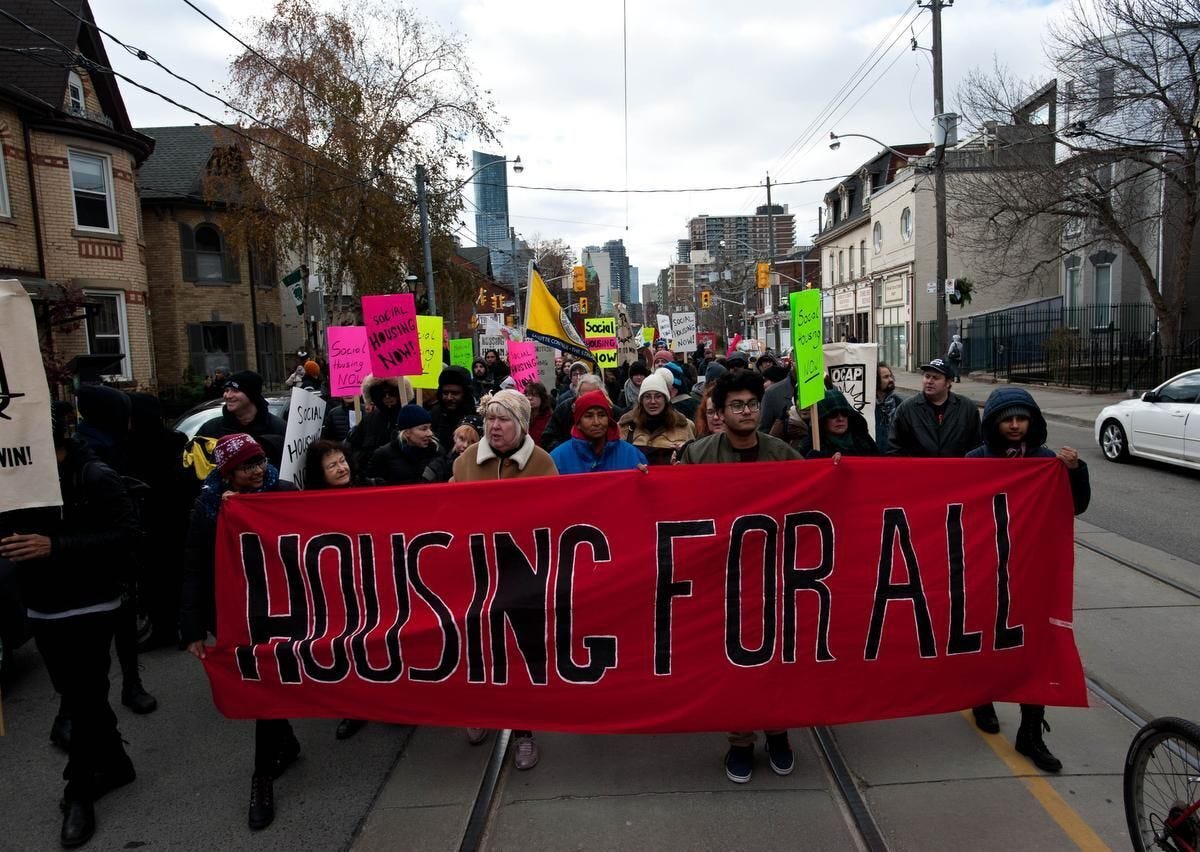No Market Solution to the Housing Crisis
by Yener Kara - Canada’s housing crisis has reached catastrophic proportions and is only worsening. There is less affordable housing available, and homelessness is on the rise, all while the federal and provincial governments prioritize profit over people’s human right to housing.
The average price of a home in Canada is approximately $670,000, up 6.3% from the previous year. It is even higher in Ontario and British Columbia, at $860,000 and $970,000, respectively, according to the Canadian Real Estate Association. The median national rent rates have also been increasing across the country, rising by 15% since last year. The national average for a two-bedroom rental is now $2,285, with prices soaring to $3,850 in Vancouver and Toronto. In Toronto, nearly half (48%) of the city’s residents rent their homes, and close to 40% of renter households live in unaffordable housing, meaning they spend 30% or more of their income on housing.
Compared to income growth, housing prices have grown four times, and rental costs have doubled in speed. The chronic shortage of affordable housing is expected to worsen due to market-based efforts to subsidize or incentivize developers and landlords, turning homes into speculative assets. A report released in June by the Canada Mortgage and Housing Corporation estimates that over 22 million housing units will be required by 2030 to achieve housing affordability for all Canadians.
There is simply not enough social housing, a problem that has been building for 40 years, which is a natural result of government disinvestment from housing, the growth of institutional ownership of built-to-rent and multi-family housing in Canada, and the lack of rent regulations for vacant units. These factors have contributed significantly to the sharp decrease in rental housing affordability in major metropolitan areas. Expect to wait at least 14 years for an affordable one-bedroom unit in Toronto and six years in Montreal.
According to Statistics Canada’s Canadian Housing Survey, 1.5% of households, totaling more than 227,000, are on waiting lists for social or affordable housing. The majority of these households, more than 148,000 of them, had been waiting for two years or longer. Since 2007, the waitlist for social housing has increased by 68%, while available social housing units remain unchanged in Toronto.
Only 5% of the Liberals’ $82 billion National Housing Strategy is allocated to the Community Housing Initiative, and those funds are solely for maintaining expiring operating agreements, not for creating new housing. The federal government has not made any new long-term investments in public housing since 1994. The new Housing Minister, Sean Fraser, himself admits it was a mistake for the federal government to withdraw from funding and building public housing. Currently, Canada’s public housing stock is only 3.5%, half of the OECD average.
The lack of sufficient social housing disproportionately affects lower-income households, pushing them into precarious housing situations, increasing the risk of eviction and homelessness. Approximately 235,000 Canadians become homeless every year, with 35,000 sleeping in shelters or on the streets on any given night. 1.7 million are unable to afford adequate and suitable shelter.
Immigrants are among the groups with the widest housing affordability gaps, as a study led by Simon Fraser University’s Yushu Zhu reveals. However, more and more racist remarks are being heard that blame immigrants for the housing crisis. For example, Ontario Premier Doug Ford continues to attribute the housing crisis in his province to the need to accommodate Ottawa’s abrupt increase in the number of newcomers to Canada. When asked about the housing crisis taking a turn into anti-immigration sentiment, Trudeau repeats the mistaken assumption that a labour shortage in construction is causing the housing crisis. Conservative Leader Pierre Polievre has so far refrained from making a direct link between the housing crisis and immigration but suggests market solutions, such as lowering interest rates on mortgages and removing bureaucracies that he accuses of slowing construction and selling federal land and buildings to “build, build, build”.
There is no market solution to the chronic shortage of affordable housing. Instead, what is needed is for the federal government to build sufficient, publicly-owned, high-quality, environmentally sustainable, union-built housing in liveable, walkable communities, available on an affordable, rent-geared-to-income basis, as stated by the NDP Socialist Caucus. Also needed is a Social Investment Bank to fund co-ops, and to work diligently to eradicate homelessness in the first mandate of an NDP government. The provision of shelters should focus on oppressed communities – and especially women and LGBTQ folks – where victims are fleeing violence, abuse and discrimination. This public housing effort can only be possible if the federal government commits to adequately funding the construction and operations of such housing indefinitely as a human right. The funds necessary for this can be allocated from the wasted public expenditure on national defence, including the 88 F-35 fighter jets that the government procured at a cost of over $70 billion.
The housing crisis can be traced back to a fundamental contradiction within capitalism, where profit takes precedence over social needs. To address this crisis, the key step is to shift away from treating housing as a commodity for buying and selling in the market. Instead, we must ensure that everyone in need has access to adequate housing as a public necessity. This, of course, necessitates a social transformation, which cannot be expected from the bourgeois governments.
Photo: An undated photo from a housing rally and march organized by the Ontario Coalition Against Poverty. Source


